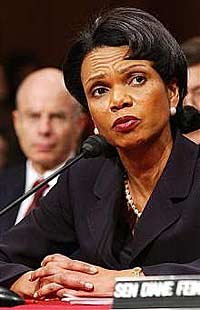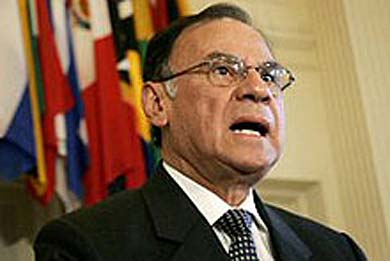
In the first of two hearings before the Senate Foreign Relations Committee, which began yesterday, Secretary of State designate Condoleezza Rice singled out Venezuelan President Hugo Chávez as a "negative force" in Latin America.
“We are very concerned about a democratically elected leader who governs in an illiberal way," said Rice, accusing Chávez of meddling in the affairs of other nations, having taken action against members of the opposition and stifling the independent media. "We’re going to have to, as a Hemisphere that signed a Democracy Charter, be devoted to making sure that those who signed that charter live up to it.”
Although the confirmation hearing primarily concerned itself with the administration’s exit strategy for Iraq, Israeli-Palestine conflict, and conflicts in areas such as North Korea, the Sudan and Haiti, the brief moments devoted to Latin America focused on Venezuela. Rice told the committee that the United States would not remain indifferent to Venezuelan politics, pledging that during her tenure, she would hold Latin American leaders who failed to uphold the principles of democracy accountable.
Noticeable differences could be detected between the overall tone of the future Secretary of State, who repeatedly affirmed that the "the time for diplomacy is now," and her stance towards the petroleum-rich nation, implying that Rice’s promises of greater international cooperation and a change in international policy are not likely to apply to Venezuela.
Relations between Venezuela and the United States have been strained since the Bolivarian President assumed office in 1998. Undeniably, they have taken a turn for the worse, as evidence continues to emerge on US support for the short-lived coup which briefly ousted Chávez in April, 2002 and on-going financial support for opposition groups, via the National Endowment for Democracy and the US Agency for International Development (USAID).
Chávez has expressed hopes that Washington’s policies towards Latin America would take a turn for the better, yet he remains wary of his northern neighbor, criticizing the uni-polar world advocated by the latter, the circumventing of the United Nations in the wars against Iraq and Afghanistan, and the effort to set up free trade treaties that would undermine the sovereignty of Latin American nations.
During the 9 hour hearing, Rice was questioned by Democrat Christopher J. Dodd, who has recently returned along with Senators Davenport Chafee (R-RI) and Bill Nelson (D-Fl) from a visit to several South American countries, including Venezuela, about US policy towards the oil-rich nation.
Although Dodd stated that he appreciated Rice’s concerns, he went on to add that the Bush administration was unnecessarily straining bi-lateral relations and "digging the hold deeper and deeper." He emphasized, "This is a two-way street... [w]e need to work at it, and I hope we do."
After Rice had classified the Venezuelan government as "unconstructive," the Connecticut senator asked her to take a more moderate tone. "This is disrespectful to the Venezuelan people. They have spoken," he said, referring to the referendum on August 15th, 2004, in which President Chavez’s mandate was reaffirmed.
Dodd cited improved relations with Brazilian President "Lula" da Silva, noting, "I can go back and show you statements that President Lula made that can compete with anything President Chavez has said...Yet we find a way to work with this new president. My strong suggestion is that we find ways to do this...This is an important relationship, it’s important in the hemisphere. We need to work at it."

In response to Rice’s comments, Venezuelan Minister of Foreign Relations, Alí Rodríguez, held a press conference early Wednesday afternoon, in which he classified her declarations as "grave, although nothing new."
Rodríguez then proceeded to launch his own accusation, alleging that Washington has intensified the diplomatic crisis between Colombia and Venezuela and has interfered in internal affairs of Venezuela.
"In order to be able to maintain a constructive relationship...it is absolutely necessary and imperative to respect the sovereignty and the right to self-determination of other countries, a principle consecrated in the United Nations Charter." Alluding to US funding for opposition groups, Rodriguez added, "If this was an isolated comment, it would be bad enough in itself, but [the US] is also looking to stir up trouble...to support dissidents within the country...without deeming this to be meddling in the internal affairs of another nation."
In spite of this, he reiterated that Venezuela "wants to improve relations with the United States," denying that the Bolivarian government has intentions to suspend the flow of petroleum to the United States, "except in the case of extraordinary circumstances. While there is a relationship of mutual respect and non-intervention, Venezuela plans to increase production in order to satisfy the growing demand for energy in the United States."
He recognized the fundamental differences in the policies between the two governments, criticizing the future Secretary of State for not having referred to poverty in Latin America and invited her to visit the poor barrios of Venezuela to see the accomplishments of the country’s literacy and healthcare programs.
 Articles by this author
Articles by this author











Stay In Touch
Follow us on social networks
Subscribe to weekly newsletter